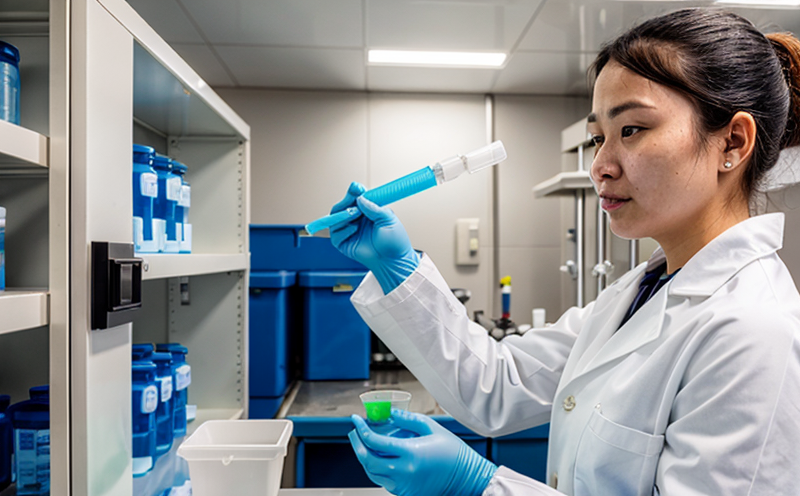USP Legionella Detection Testing
The USP Legionella Detection Testing is a critical service provided to ensure compliance with United States Pharmacopeia (USP) requirements, particularly for the testing of water systems in healthcare facilities and other settings where legionellosis risk exists. This service focuses on detecting Legionella pneumophila in potable water samples, which can be transmitted through aerosols and cause severe respiratory infections known as Legionnaires' disease.
The USP has established a series of tests to ensure the safety and quality of pharmaceutical products and their manufacturing environments. Among these is the detection of Legionella, which is crucial for maintaining public health and preventing outbreaks in healthcare settings. This service plays an essential role in safeguarding patient well-being by ensuring that water used in medical procedures or consumed by patients is free from harmful microorganisms.
The testing process involves collecting samples from relevant water systems, transporting them under controlled conditions to the laboratory for analysis. The specimens are then processed using advanced microbiological techniques such as culturing on selective media and molecular methods like PCR (Polymerase Chain Reaction). These methods enable accurate identification of Legionella pneumophila in a timely manner.
Accurate detection is paramount, not only to comply with regulatory standards but also to protect the health and safety of individuals who may come into contact with the water supply. The results from this testing help facilities identify potential sources of contamination early on, allowing for prompt corrective actions to be taken before an outbreak occurs.
Regulatory compliance is a key factor in pharmaceutical manufacturing, especially concerning water systems used in healthcare settings. USP General Chapter 1234.pdf" target="_blank">1234 provides guidelines for the detection and control of Legionella in water systems. Adherence to these standards ensures that pharmaceutical products meet the highest quality standards, thereby protecting public health.
This service is particularly beneficial for healthcare facilities, hospitals, nursing homes, and any other institution where large numbers of people are exposed to potentially contaminated water supplies. By providing reliable detection services, we contribute significantly to maintaining a safe environment for patients and staff alike.
Benefits
The USP Legionella Detection Testing offers numerous benefits that align with the needs of various stakeholders within pharmaceutical and healthcare sectors. Firstly, it ensures regulatory compliance by adhering to strict guidelines set forth by the United States Pharmacopeia (USP), which is crucial for maintaining a high standard of product safety.
Secondly, this service enhances patient safety by preventing the spread of Legionella pneumophila through contaminated water supplies. By identifying and addressing potential sources of contamination early on, healthcare facilities can significantly reduce the risk of outbreaks that could lead to severe respiratory illnesses such as Legionnaires' disease.
In addition to these direct benefits, USP Legionella Detection Testing also supports quality management systems (QMS) by providing data-driven insights into water system performance. This information helps facility managers make informed decisions about maintenance schedules and operational procedures, ultimately leading to more efficient and effective resource utilization.
Moreover, the service fosters trust between healthcare providers and their patients by demonstrating a commitment to maintaining the highest level of hygiene standards. Patients are reassured knowing that the water they come into contact with is free from harmful microorganisms, which contributes positively towards overall patient satisfaction and confidence in the facility's services.
For R&D engineers and procurement teams within pharmaceutical companies, this service provides invaluable support during product development stages and supplier evaluation processes. Accurate data on water quality can influence design choices and material selection decisions, ensuring that final products meet stringent safety requirements while being cost-effective and sustainable.
Quality and Reliability Assurance
The USP Legionella Detection Testing adheres to rigorous quality assurance protocols to ensure accurate and reliable results. Our team employs state-of-the-art equipment, trained professionals, and standardized procedures to analyze water samples collected from various locations within healthcare facilities.
Our laboratories are equipped with specialized instruments designed for precise detection of Legionella pneumophila, including automated colony counters, PCR machines, and microbiological incubators. These tools provide consistent results across multiple tests, allowing us to maintain high standards of accuracy and precision.
In addition to our technical expertise, we also follow strict quality assurance practices in sample collection, transportation, and storage to prevent contamination or degradation during transit. This comprehensive approach ensures that all samples arrive at the lab in optimal condition for analysis.
We employ certified personnel who have undergone extensive training on USP methods for legionellosis testing. Regular audits are conducted internally to ensure ongoing adherence to best practices and continuous improvement of our processes. External accreditation bodies regularly review our operations to verify compliance with international standards such as ISO 17025.
Our commitment to quality extends beyond internal procedures; we work closely with clients to understand their unique needs and challenges, tailoring each testing program accordingly. By doing so, we can offer customized solutions that meet specific regulatory requirements while addressing broader operational objectives.
Use Cases and Application Examples
| Use Case | Description |
|---|---|
| Data Collection for Regulatory Compliance | Gathering comprehensive data on Legionella levels in potable water supplies to ensure compliance with USP standards. |
| Outbreak Investigation and Response | Identifying sources of contamination during an outbreak investigation, enabling swift implementation of control measures. |
| New Facility Commissioning | Ensuring newly constructed or renovated healthcare facilities meet water quality standards before opening to the public. |
| Operational Monitoring | Regular monitoring of water systems throughout their lifecycle to detect early signs of contamination and prevent outbreaks. |
| Supplier Evaluation | Evaluating the quality control practices of suppliers providing raw materials or equipment used in manufacturing processes involving water. |
| Risk Assessment for High-Risk Environments | Conducting risk assessments for environments where legionellosis poses a significant health threat, such as hospitals and long-term care facilities. |





